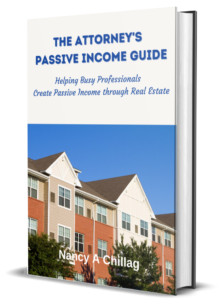Most investors have some familiarity with the big 3 traditional types of investing: stock market investing, REITs, and real estate. Many will only be familiar with the type of real estate investing that involves sacrificing your time as a landlord.
However, you’re here because you’ve discovered passive real estate investing in real estate syndications. So how does this type of real estate investing compare to stocks and REITs?
In this article we’re going to dive into the pros and cons, benefits and risks, advantages and disadvantages of these 3 types of investing.
Stock Market Investing Compared To Passive Real Estate Investing
We’ll start with looking at how investing in passive real estate investments compares to growing your capital in the stock market. From there, we’ll take a look at REITs specifically and see how they stack up against real estate syndications.
Long-Term Returns and Continuous Cash Flow
When assessing traditional assets like stocks or bonds, you typically encounter one-time cash payouts. However, in real estate syndications, you have the opportunity to invest in properties that generate positive cash flow without the need to sell them. This ensures a continuous stream of income, allowing you to keep the cash flowing over the long term.
Immediate Income through Real Estate Cash Flow
While stocks may pay dividends, few provide returns above 4%, barely keeping up with inflation. In contrast, real estate investors seek cash-on-cash returns of 7-10% or more, surpassing the meager 4% return offered by stocks.
With real estate syndications, you can enjoy immediate income through cash flow, sometimes starting in the first quarterly distribution. You’re then able to either use that income immediately or redeploy it in other investments to compound the growth.
Becoming an Expert Made Easy
Becoming well-versed in your desired real estate asset class or market doesn’t require a degree and can easily be achieved as a passive investor. By utilizing public information, such as population and job statistics, area rents, economic conditions, and real estate market trends, you can swiftly gain insights and identify potential markets to invest in and evaluate an asset.
Once a passive investor feels comfortable evaluating a market and a particular investment offering, it is easy to rinse and repeat.
It is much more challenging to become an expert in an individual company’s business plans for investing in the stock market. Most investors rely upon a financial planner to do the heavy lifting of identifying stocks to purchase that will out-perform the market. This seemingly solves your problem. However, this often comes with hefty (and hidden) fees that will greatly diminish your portfolio value over the long term.
The Ability to Inspect Real Estate
When investing in real estate, you have the advantage of inspecting the property before making a purchase, even as a passive investor. You can literally go to the property and do a “secret shop” to see the facility and experience the building as a tenant would experience it. You can also inspect the property, or the business plan and market, virtually. Most real estate investors become familiar with basic market evaluation tools, like population growth or job growth statistics. You can also perform basic searches for crime in the region, or other mentions of the property online. Most real estate syndications will additionally have extensive due diligence performed to ensure your capital preserved over the holding period.
On the contrary, scrutinizing every aspect of a company to validate its stock valuation is virtually impossible. By investing in real estate syndications, you gain the confidence of having personally assessed the property, ensuring that it aligns with your investment goals.
Straightforward Valuation of Real Estate
Unlike intangible assets with subjective valuations, real estate is comparatively easier to value due to its inherent comparability. Even if you lack expertise in property valuation, the process is not daunting, and there are numerous resources available to assist you in understanding if properties are over or under valued for a given market.
By utilizing online data, comparing properties to similar ones in the area, assessing overall conditions, and asking questions to the sponsor, you can derive a reasonably accurate ballpark understanding of the property values in your market.
Opportunities for Value Addition in Real Estate
Outside of corporate roles in public companies, it is challenging to significantly influence stock value. However, real estate offers ample opportunities to add value to your assets. Just as flippers enhance property value by making repairs or renovating properties to meet current buyer standards, a real estate syndication can greatly increase in value with specific upgrades and renovations.
Even better than a rental property, these upgrades often lead to direct increases in rent, which in turn increases the net operating income. This amount is used in the valuation of commercial real estate, unlike residential properties which are valued based on other houses in the area (called comparables or comps). With real estate syndications, you have the freedom to actively participate in value-adding activities.
Investing passively in real estate syndications presents a host of advantages, including long-term returns, continuous cash flow, easy valuation, inspection opportunities, and the potential for value addition. Embrace the world of real estate syndications and unlock the potential for financial growth and control over your investments.
Non-Traded and Publicly-Traded REITs: Understanding the Risks and Rewards
Non-traded REITs, also known as non-exchange traded REITs, offer investors an alternative to traditional stock exchange investments. These are private offerings, and can be harder to access for the everyday investor. As they do not trade on a stock exchange, investors may face challenges finding buyers or sellers when they want to transact.
Publicly traded REITs are open to any investor and are listed on major stock exchanges. You may invest in them directly, through mutual funds, or via exchange-traded funds, quickly and easily online.
REITS can have benefits when compared to traditional real estate investing and passive investing in real estate syndications. However, it is essential to be aware of the risks associated with these investment vehicles as well. Let’s take a look at both.
Confusing Liquidity
For a publicly traded REIT, you can buy or sell shares of your REIT at any time. However, for non-publicly traded REITs, which are some of the most lucrative, capital is less liquid. These often have minimum investment periods of 7 years or more. However, REIT managers may even limit the withdrawal of capital beyond that. Certain events or market conditions may cause a REIT to block withdrawals, or essentially render your liquid capital illiquid at the drop of a hat. One such time was during the interest rate increases in early 2023 when so many investors went to cash out of their shares at the same time.
However, it is essential to understand the fees associated with REITs, as there may be some associated fees if you elect to withdraw your funds early.
Real estate syndications are accompanied by a business plan that often defines holding the asset for a certain amount of time (often 5 years), during which your money is locked in, or illiquid.
Distribution Requirements And Tricky Loopholes
REITs are legally required to return 90% of their taxable income to you, the shareholder. This is why they can offer a higher yield compared to the rest of the stock market. However, they sometimes do distribute in tricky ways that may not reveal any distress they may be experiencing.
For instance, REITs may sometimes pay dividends using funds from other investors rather than property-generated income. This practice can impact the REIT’s cash flow and potentially decrease the value of shares.
The Hidden Fees Of REIT Investing
Savvier stock market investors know to look for the expense ratio of any fund they’re investing in. Often, the fees of these funds (in the ballpark of 1-2%) can significantly hinder your portfolio’s growth.
For REITS, fees are also a consideration. Non-traded REITs often charge upfront fees ranging from 9% to 10%, and sometimes as high as 15%. Additionally, if the REIT has an external manager, these fees can further reduce investor returns. Understanding the fee structure and management practices is crucial before investing in a non-traded REIT.
There are fees associated with real estate syndications, but they are baked into the underwriting and projections for the deal. In other words, the return projections (such as the 8% preferred return or 1.8x equity multiple you’re seeing in the investment summary) already include those fees.
Publicly Traded REITs: Risks to Consider
While publicly traded REITs offer a safer investment option compared to their non-exchange counterparts, it is essential to be aware of the potential risks associated with these investments.
Interest rate risk is a significant consideration for publicly traded REITs. When interest rates rise, the demand for REITs often decreases. This can cause a cascade of difficulties for managing the properties inside a REIT or even allowing full withdrawals of capital. Remember what I mentioned in the above paragraph on liquidity?
Investors tend to gravitate towards safer income plays, like U.S. Treasuries, when interest rates are high. Historically, REITs have not performed well during periods of rising interest rates.
Real estate syndications can also be impacted by rising interest rates. You can mitigate this risk by taking a look at the debt source for any potential investment offering. Is there an interest rate cap that will prevent rising interest rates from eating into your cash flow? Or is there fixed-rate debt on the property that won’t be impacted by rising rates?
The Big Tax Disadvantages Of REITs
Lack of tax advantages is one of the biggest downsides to REITs, and the biggest reason to grow your capital through syndications instead.
Although not necessarily a risk, it’s important to note that REIT dividends are taxed as ordinary income. This means that the tax rate on REIT dividends is the same as an investor’s income tax rate, which is typically higher than dividend tax rates or capital gains taxes for stocks. This can make your tax bill bigger.
Real estate syndications, on the other hand, have the potential to decrease your tax liability. When you invest directly in any property (real estate syndications included), you receive a variety of tax deductions, the main benefit being depreciation (i.e., writing off the value of an asset over time).
Oftentimes, the depreciation benefits surpass the cash flow. So, you may show a loss on paper but have positive cash flow. Those paper losses can offset your other income, like that from an employer.
When you invest in a REIT, because you’re investing in the company and not directly in the real estate, you do get depreciation benefits, but those are factored in prior to dividend payouts. There are no tax breaks on top of that, and you can’t use that depreciation to offset any of your other income.
Conclusion
It is up to you and your specific investing goals to determine which type of investing is right for you. You may prefer a mix of the asset classes described in this article, or be drawn to one in particular.
By understanding the risks associated with investing in REITs, the stock market, and real estate, investors can make informed decisions that align with their investment goals and risk tolerance. As with any investment, thorough due diligence, proper research, and seeking advice from experienced professionals can contribute to making prudent investment choices.


